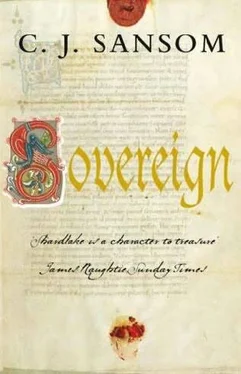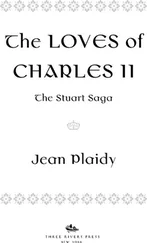It felt strange to pass under the Great Gate again, to see the solid red-brick buildings of Gatehouse Court, the barristers passing to and fro. Acquaintances nodded to me as I made my way to the Treasurer’s office, but I was eager to press on and conclude my business. As the Treasurer disclaimed all responsibility for the flood at first, I sharply reminded him of the laws of nuisance and before I left I had the promise that a trench would be dug on the morrow. I returned to my chambers feeling slightly more cheerful.
Two solicitors were passing by; they paused and eyed me curiously. I frowned; my hand was in the pocket of my robe, the manacle well hidden.
My clerk Skelly was busy at his desk. He greeted me with a genuine enthusiasm that disarmed me, his eyes shining behind his glasses. ‘I have prayed for you, sir,’ he said. ‘Out among those wild heathens. And now you are returned to us. But your face is swollen, sir.’
‘A bad tooth,’ I said. And indeed it was throbbing again. So at least rumours about my imprisonment had not reached Lincoln’s Inn. They would soon enough, though. ‘How is the work?’ I asked. I had parcelled my cases out among barristers I knew and trusted to deal with while I was away.
‘No real problems, sir. Brother Hennessy won in Re. Cropper last week.’
‘Did he? Good.’ I paused. ‘I have heard there have been officials from the Privy Council at the Inns, making enquiries to do with the spring conspiracy.’
‘Not here, sir.’ He wrinkled his nose. ‘Maybe up at Gray’s Inn.’

IT WAS EARLY AFTERNOON before I brought myself up to date. Yes, I thought, there is enough business here for me to pick up and be quite busy. And the payment Cranmer had promised would mean I could clear the debt on my father’s estate. There was a letter waiting from the mortgagee asking when he would be paid, and I wrote a terse reply saying he would not have to wait long. Then I went over to the dining hall for lunch.
I had decided I would walk up to Gray’s Inn that afternoon, and over my meal I thought more about Martin Dakin. What if he spurned the idea of mending his quarrel with Giles, as he might, given what family quarrels can be like. Again I wondered if my concern for the old man was linked to my guilty feeling that I had let my father down. But no, I thought, this is the only right thing to do.
As I walked to the gate I saw Bealknap approaching from his chambers. I wondered if he had seen me from his window. ‘Brother Shardlake!’ He greeted me cheerfully. ‘I hear you have had some adventures since we last met – some trouble with His Majesty at York, was it not? And a sojourn in the Tower.’ His eyes went to my right hand, where the damned manacle had slipped down and was visible. ‘Goodness me,’ he said mildly.
‘My time in the Tower is not generally known about yet. Richard Rich told you, no doubt. He had me put there.’
‘Your face is swollen, Master Shardlake,’ Bealknap said with fake concern. I had a sudden memory of the torture chamber, the crack as the tooth was broken off, the terror. I blinked, then glared at my opponent. His eyes slid away from meeting mine.
‘You know the Guildhall have settled your case,’ he said with that gentle smile of his. ‘Each side pays their own costs. Doubtless you will have a large bill for the Guildhall. Mine is being defrayed by the Court of Augmentations.’
‘By Rich.’
‘By the court. Because of their interest in the case. Well, it has been an interesting result.’ He removed his cap, made a mocking, exaggerated bow and walked on.
‘Next time it will be a fair fight,’ I shouted after him. ‘And I will beat you! I will best you yet, Bealknap!’ He did not turn.

I WALKED UP Chancery Lane to Gray’s Inn, just the other side of Holborn. The rain still held off although the sky was grey and heavy. I asked for Garden Court at the porter’s lodge and was directed to a building on the other side of the courtyard. As I walked across, looking at the barristers going to and fro, I thought that Bernard Locke’s contact, the one he was to give the papers to, could be here – unless he had been taken. I went through the door and found myself in an outer office, where a plump little clerk looked up from his desk.
‘Good afternoon,’ I said. ‘Matthew Shardlake, from Lincoln’s Inn. I am seeking a brother who works in Garden Chambers. Martin Dakin.’
The clerk sat upright. ‘Oh,’ he said. He looked surprised, then flustered.
‘You know the name?’
‘Yes, sir, but…’ He got up slowly, his eyes still on my face. ‘If you would wait a moment, perhaps you should speak to Brother Philips. Excuse me.’
He went across to a door, knocked and went in. I stood waiting. Anxiety clawed at me. The clerk had looked startled, concerned. Has Dakin been taken in for questioning, I wondered. I looked around the room, its tables piled with papers tied up in pink ribbon. This was where Bernard Locke had practised too. I remembered that last sight of him in the Tower, his broken limbs and burned face, and shivered.
The clerk reappeared in the doorway. ‘Brother Philips would like a word, sir.’ He stood aside to let me enter, looking relieved to be passing me on.
Inside a room very like my own, a plump middle-aged barrister had risen from behind a desk. He looked exhausted, dark circles under his eyes. He bowed, then looked at me with an expression of concern.
‘Brother Ralph Philips,’ he said. His accent revealed him as a man of the north.
‘Brother Matthew Shardlake, of Lincoln’s Inn.’
‘You are seeking Brother Martin Dakin?’
‘Yes.’
‘Do not think me impertinent, sir, but – might I ask your connection?’
‘I am a friend of his uncle, Brother Giles Wrenne of York. He fell out with his nephew years ago, and has come to London to put things right. I have been with the Progress in York. Brother Wrenne came back with me, he is at my house in Chancery Lane.’ I paused. ‘He is aged, and not well.’
‘Ah.’ Brother Philips sighed heavily.
‘What has happened?’ I asked, more sharply than I should. ‘Has he been taken for questioning about the northern conspiracy? I know there have been enquiries among the lawyers.’
He gave me a keen look. ‘Yes, they have been here. We have all been questioned.’ He sighed again. ‘But no one has anything to hide, and certainly not Brother Dakin.’ He smiled, a strange sad smile.
‘Then what?’
‘Martin Dakin is dead, sir. He died the winter before last, from a congestion of the lungs.’
‘Oh no,’ I breathed. ‘Oh no, that is too hard.’ All Giles’s efforts, all his hopes, the journey that had taken such a toll on him. All for nothing.
‘Are you all right, sir?’ Brother Philips came round his desk, looking concerned.
‘Yes. Forgive me. It was a shock. I had not expected…’ So that was what Locke had meant, in the Tower. Martin Dakin was safe because he was dead. And he had been using the past tense to refer to Dakin, not himself. I stifled a groan. Then a ray of hope struck me. ‘Had he a wife, any children?’
‘I fear not.’ Brother Philips shook his head. ‘He had no relatives I knew of, and I never heard mention of an uncle.’
‘They had fallen out.’ I looked at him. ‘So he had no one.’
‘Not that I know of. The Inn Treasurer took charge of his belongings when he died.’ He hesitated. ‘I should say, sir, Brother Dakin and I were not close.’
‘No.’
Brother Philips hesitated. ‘He was a very strong reformer, brother, and not many in these chambers are.’
Читать дальше














